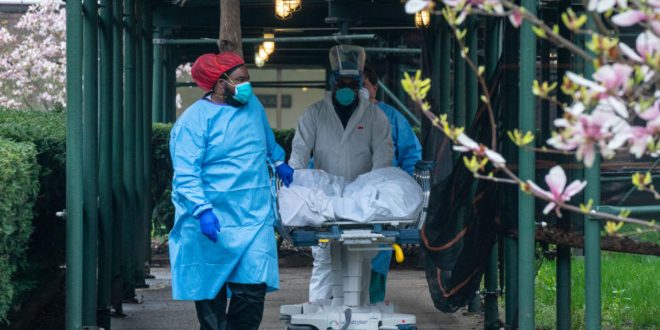Andrew Yang sues New York Board of Elections over canceled primary
Former presidential candidate Andrew Yang filed a lawsuit in federal court on Tuesday against the New York State Board of Elections. The lawsuit comes one day after the board’s decision to effectively cancel the presidential primary.
Joined by seven other New Yorkers who filed to serve as Yang delegates to the Democratic National Convention, the entrepreneur-turned-political candidate argues he met all of the necessary requirements and did not ask to be removed from New York State’s ballot.
“This unprecedented and unwarranted move infringes the rights of Plaintiffs and all New York State Democratic Party voters, of which there are estimated to be more than six million, as it fundamentally denies them the right to choose our next candidate for the office of President of the United States,” the lawsuit reads in part.
New York state, the epicenter of the coronavirus pandemic, on Monday took the unprecedented step of canceling its June 23 presidential primary, citing coronavirus concerns. That decision means no other candidate will have the chance to appear on the ballot in the state and Joe Biden, the presumptive Democratic nominee, will receive all the 274 pledged delegates.
Trump invokes Defense Production Act to keep meat processing plants open
President Trump signed an executive order on Tuesday invoking the Defense Production Act to keep meat processing plants open, a senior White House official told CBS News. Plants owned by some of the country’s largest food companies have struggled with outbreaks of the coronavirus among workers and a growing death toll.
The executive order also applies to plants that have already closed, which will have to reopen with healthy workers.
The executive order declares meat processing plants critical infrastructure to protect against disruptions to the food supply, a person familiar with the matter said earlier Tuesday. The federal government will also provide workers with additional protective gear and guidance, the person said.
Restaurants prepare to reopen with virus guidelines
By one estimate, restaurants in the U.S. have lost a combined $80 billion during the shutdown. Some restaurant owners are turning back the clock to stay open and stay safe.
Watch Carter Evans’ report below:
Over 60% of immigrants screened for the coronavirus in ICE custody have tested positive
More than 60% of immigrants who have been screened for the coronavirus while in U.S. Immigration and Customs Enforcement custody have tested positive, illustrating the challenges of containing the spread of the highly contagious disease inside secure government detention facilities.
At least 425 of the 705 immigrant detainees who have received coronavirus screenings have tested positive, according to ICE’s latest tally. Eight of the scores of county jails, for-profit prisons and detention centers used by the agency to hold more than 30,000 undocumented immigrants and green card holders have at least 15 cases each.
In the past two weeks, cases among ICE detainees have grown on a consistent basis, with the agency reporting 45 new cases on Tuesday alone. About 700 older immigrants, detainees with chronic health conditions and pregnant women have been released from ICE custody in light of the pandemic. But the agency has so far resisted calls from advocates to release a larger group of immigrants, including asylum-seekers and others who don’t pose a threat to the public.
As cases among detained immigrants inside the U.S. have grown, so have cases among immigrants who officials have deported. At least 102 migrants recently deported to Guatemala by ICE have tested positive for the coronavirus, according to the Guatemalan government. They made up more than 19% of the country’s 530 total cases as of Monday night.
Health care workers struggle with stress of battling pandemic
One of the effects of the coronavirus is that the mental health crisis is worsening among health care workers who are battling the pandemic.
Dr. Lorna Breen, 49, a New York hospital medical director, took her own life Sunday. Colleagues described her on social media as “a true friend and a compassionate warrior” and “a great emergency physician, great person and great friend.”
Dr. Ayman Fanous, the head of psychiatry for SUNY Downstate Medical Center, fears for other health care workers. “These workers have seen more death than they’ve ever seen in their entire careers,” Fanous told CBS News.
Fanous has seen a dramatic increase in the number of doctors and nurses seeking support therapy.
“As we see in war when you get shocked, you might not feel the full impact of the pain right away, but with time, you’ll see more and more symptoms … insomnia, possibly flashbacks and nightmares,” he explained.
Oxford scientists hopeful vaccine could be widely available by September
In the global race to find a vaccine, Oxford University just jumped way ahead of the pack. Human testing is already underway, and scientists say they’re hopeful a coronavirus vaccine will be widely available by September.
Technology the lab had already developed in previous work on inoculations for other viruses, including a close relative of COVID-19, gave it a head start.
“Well personally, I have a high degree of confidence about this vaccine, because it’s technology that I’ve used before,” said Sarah Gilbert, a professor of vaccinology at the university.
The vaccine takes the coronavirus’ genetic material and injects it into a common cold virus that has been neutralized so it cannot spread in people. The modified virus will mimic COVID-19, triggering the immune system to fight off the imposter and providing protection against the real thing.
EU countries express concern over Venezuela
The U.N. Security Council has taken no action after discussing the humanitarian situation in Venezuela behind closed doors, but its European Union members are warning the coronavirus pandemic “risks having a devastating human impact in a country grappling with an already grave economic, social and humanitarian situation.”
A statement by France, Germany, Belgium, Estonia and former council member Poland issued after Tuesday’s meeting reiterated their concerns “about the sharply deteriorating crisis in Venezuela and its destabilizing effects across the region, including its severe humanitarian consequences.”
The members noted the European Union is the largest donor to Venezuela’s humanitarian crisis, “providing more than half of all funding,” and they called for stepped up efforts to respond to the country’s underfunded humanitarian emergency.
More than 2,800 NYPD officers out sick
More than 2,800 uniformed members of the NYPD called in sick on Tuesday, the department said. That’s 8% of the workforce, down from a high of 19.8%.
Nearly 5,000 NYPD members have tested positive for the virus, but more than 3,700 have already recovered and returned to work. Thirty-seven members of the service have died.
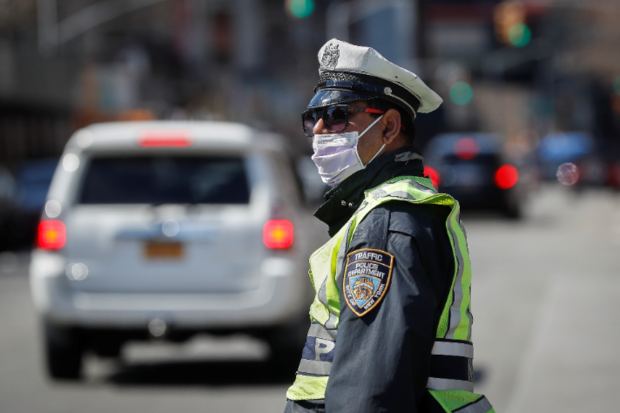
AP
Trump again says virus is “going to go away,” contradicting his health experts
President Trump on Tuesday said the coronavirus is “going to go away,” repeating a line he’s said in the past that contradicts his own health experts. Dr. Anthony Fauci, the administration’s leading infectious diseases expert, has said the deadly virus will not disappear, and the U.S. should be prepared for another wave in fall.
Mr. Trump, making the remarks in an East Room event with businesses that turned into a press conference, said a vaccine is looking promising, but he thinks the virus is going to go away, and if it does return in a “modified” form in fall the U.S. will handle it.
CBS News White House correspondent Ben Tracy asked, “Mr. President, you said at the top of your remarks that you feel the worst of the pandemic is behind us. But without a treatment, without a vaccine, and states now reopening, how can you be so sure?”
The president responded: “Well I think that like other things, we’re going to hopefully we’re going to come up with a vaccine, you never know about a vaccine, but tremendous progress has been made. Johnson & Johnson and Oxford and lots of good things, you’ve been hearing the same things as I do. Tremendous progress has been made, we think, on a vaccine. You always have to say think and then you have to test it, and that takes a period of time. But uh, a lot of movement and a lot of progress has been made on a vaccine.”
“But I think what happens is it’s going to go away,” Mr. Trump added. “This is going to go away. And whether it comes back in a modified form in the fall, we’ll be able to handle it, we’ll be able to put out spurts, and we’re very prepared to handle it. We’ve learned a lot, we’ve learned a lot about it, the invisible enemy.”
Los Angeles County reaches 1,000 virus deaths
Los Angeles County has reported 59 new COVID-19-related deaths, raising the total to 1,000.
“LA County has hit the tragic milestone of 1,000 people dying from COVID-19,” county public health director Barbara Ferrer said in a statement. “Please know that if you are grieving the loss of loved ones who have died from COVID-19, our thoughts and prayers are with you, your family, and your friends.”
Los Angeles County, the nation’s most populous with 10 million residents, also reported 597 new cases, raising its total to 20,976.
The number of deaths in institutional settings rose to 462 and the majority were residents of skilled nursing facilities, the county said.
Veterans facility hit hard by coronavirus crisis
Nearly 70 residents sickened with the coronavirus have died at a central Massachusetts home for aging veterans. State and federal officials are trying to figure out what went wrong in the deadliest outbreak at a long-term care facility in the U.S.
While the death toll at the state-run Holyoke Soldiers’ Home continues to climb, federal officials are investigating whether residents were denied proper medical care while the state’s top prosecutor is deciding whether to bring legal action.
Sixty-six veteran residents who tested positive for the virus have died, officials said Monday, and the cause of another death is unknown. Another 83 residents and 81 staff have tested positive. The home’s superintendent, who’s been placed on administrative leave, has defended his response and accused state officials of falsely claiming they were unaware of the scope of the problem there.
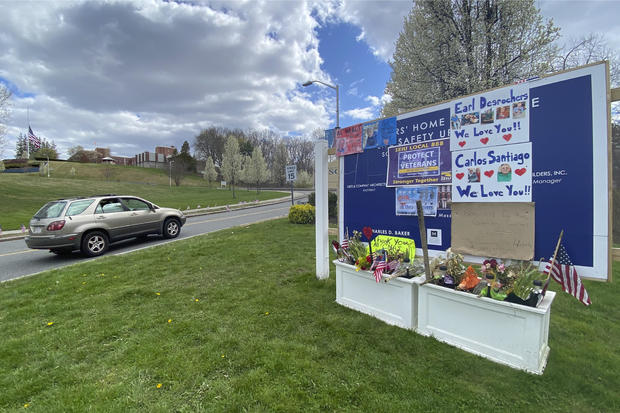
Rodrique Ngowi / AP
Mnuchin says big companies could face “criminal liability” for keeping small business emergency loans
Treasury Secretary Steve Mnuchin warned Tuesday that large companies could face “criminal liability” for keeping emergency loans intended for small businesses during the coronavirus crisis. He said the government will be auditing all companies that received more than $2 million in loans through the Paycheck Protection Program.
“The purpose of this program was not social welfare for big business,” Mnuchin said on CNBC. “The purpose of this program was to help small businesses.”
The loans are meant for small businesses with no more than 500 employees, to help them keep workers on the payroll during the pandemic. But some large companies that are worth millions of dollars and have thousands of workers applied for the funding – and got it.
Mnuchin singled out the Los Angeles Lakers, which has an estimated net worth of $4.4 billion, making it one of the richest franchises in the NBA. The privately-owned team announced this week it would return its $4.6 million loan, though it did not specify why it had applied in the first place or how it would have used the money.
“I’m a big fan of the team, but I’m not a big fan of the fact that they took a $4.6 million loan,” Mnuchin said. “I think that’s outrageous, and I’m glad they’ve returned it, or they would have had liability.”
More than 1,300 federal inmates are positive for coronavirus
As of Tuesday, 1,314 federal inmates and 335 staff members are positive for the coronavirus, according to the Bureau of Prisons. Thirty inmates have died from the virus, and 404 inmates and 132 staff have recovered, the BOP said.
California’s FCI Terminal Island has the most open cases of COVID-19 among inmates and staff in the country, with 453, according to the BOP. All but 10 of those cases are inmates — which is nearly half of the institution’s total inmate population. Texas’ FMC Fort Worth has 242 cases, and North Carolina’s FCI Butner Medium I has 221.
California considers reopening public schools as early as July
California Governor Gavin Newsom said Tuesday that his state is considering opening public schools in late July or early August so that students do not lose more learning time.
“We are considering the prospect of an even earlier school year into the fall — as early as late July or early August,” Newsom said at his daily coronavirus press conference. “We might want to consider getting that school year moved up a bit.”
On April 1, Newsom said California’s public schools would remain closed for the remainder of the school year.
“As a father of four, that learning loss is very real,” Newsom said Tuesday, adding that he thinks the change is “warranted” given the consequences school closures have had on the state’s over 6 million students. “Our kids have lost a lot with this disruption.”
Massachusetts extends closures and stay-at-home advisory
Massachusetts Governor Charlie Baker on Tuesday said the state will not reopen on May 4. Instead, the date for non-essential businesses to remain closed due to coronavirus has been pushed back to May 18.
The stay-at-home advisory remains in place as well. The ban on gatherings of 10 people or more has also been extended.
“Today we’re extending the timeline for all non-essential businesses to keep the physical workplaces and facilities closed to all workers, customers, and the public until May 18, and the stay at home advisory also remains in place during this time,” Baker said.
Baker stressed that when the state reopens, it will be a “phased” approach and not everyone will get back to work at the same time. He announced the creation of a new 17-member Economic Reopening Advisory Board Tuesday.
“This group will work on a plan that occurs in phases to help industries navigate public health guidance and implement safety measures for the new rules of the road,” Baker said, adding that the plan is due May 18.
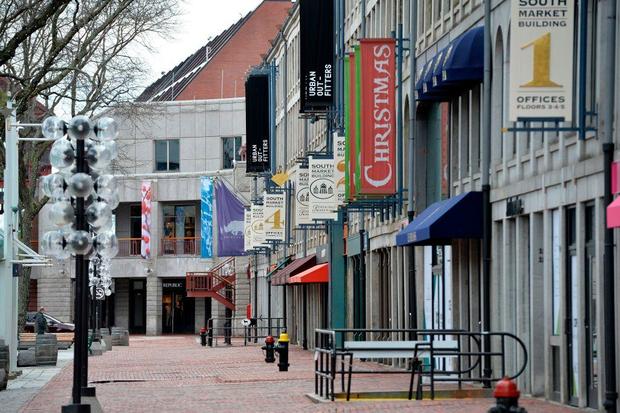
Getty
U.S. reaches 1 million confirmed coronavirus cases
The U.S. on Tuesday reached a total of 1 million confirmed coronavirus cases – now representing nearly a third of all the confirmed cases worldwide, according to data compiled by Johns Hopkins University. The U.S. is by far the country with the most confirmed cases, recording more than three times as many as the next-highest nation, Spain.
The U.S. also has the world’s highest death toll from the virus, with more than 56,700 deaths reported by Tuesday afternoon – more than one-quarter of the 213,000 deaths confirmed around the world.
A projection model from the University of Washington, which is often used by the White House and state health officials, is now anticipating more than 74,000 deaths nationwide by August 4. That’s a jump from its expected death toll of 67,000 just one week ago.
Pence forgoes a face mask at Mayo Clinic, appearing to violate policy
Vice President Mike Pence was captured on camera without a mask during a visit to the Mayo Clinic in Minnesota on Tuesday, violating Mayo Clinic policy that all staff and visitors wear masks amid the coronavirus pandemic. The Mayo Clinic took to Twitter almost immediately, writing that Pence was informed of the policy ahead of time, but the clinic later deleted the tweet.
Pence, who is tasked with leading the Coronavirus Task Force, instantly sparked criticism online when he was pictured without a mask near masked staff members and a masked patient at the clinic. According to the radio pooler present, all media members were told to wear masks and all but perhaps two others visible in the building were wearing masks.
“Mayo Clinic had informed @VP of the masking policy prior to his arrival today,” the clinic tweeted Tuesday afternoon before deleting the tweet.
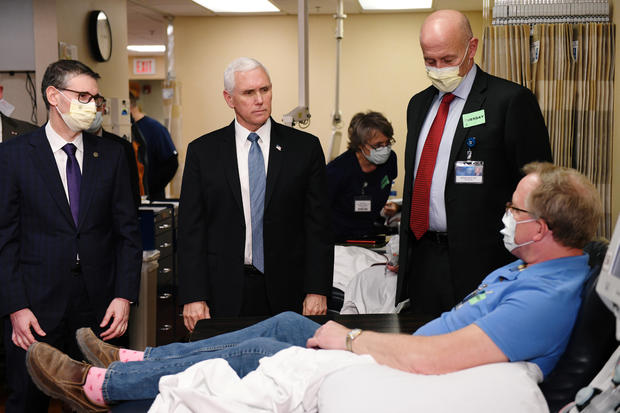
Reuters
Homeowners fear they may owe hefty lump-sum payment on mortgages
Fred Loera is scared. The Washington state resident is struggling to pay his mortgage after losing his job as a physician’s assistant earlier this month and is now on the hook for $6,600 in house payments. And that’s after getting what is supposed to be a helping hand from the U.S. government.
Loera’s loan servicer, New Residential Investment, is giving him a pass on his mortgage for three months under the $2.2 trillion Coronavirus Aid, Relief and Economic Security, or CARES Act. Yet the real estate investment firm told him he will owe the full amount once the forbearance period ends, he said.
“I’m feeling kind of panicked,” said Loera, 48. “This isn’t what I had in mind when I was looking for a little bit of assistance.”
The American Enterprise Institute estimates that 4 million home loans around the U.S. are already in “forbearance,” as the industry jargon calls the step preceding foreclosure. As more people fall behind, consumer protection groups say they are getting complaints from other homeowners who, like Loera, have obtained a measure of federal mortgage relief but also worry about owing a sizable lump sum in back payments.
Federal guidelines give homeowners other options after forbearance ends, but consumer advocates express concern that mortgage servicers are steering homeowners toward making a lump-sum payment they can’t afford.
6 months of virus lockdowns could cause 47 million women to lose access to birth control, UN says
An estimated 47 million women in 114 low and middle-income countries will not be able to access any form of modern birth control if lockdowns related to the coronavirus pandemic continue for six months, the United Nations predicted in a report released Tuesday. This will result in at least 7 million unwanted pregnancies, the United Nations Population Fund predicted, and if disruptive social distancing measures continue for a year, the number of unwanted pregnancies will hit 15 million.
“Contraceptives have to be considered life-saving essential and have to continue throughout the crisis. They should not be considered as something secondary and something you can postpone because right now you have to focus somewhere else,” Dr. Ramiz Alakbarov, deputy director of the UNFPA, the UN’s sexual and reproductive health agency, told CBS News.
Lockdowns are seriously restricting women’s movements and limiting the capacity of providers to supply birth control in many countries around the world, he explained.
The International Planned Parenthood Federation (IPPF), which runs women’s health clinics globally, said in a report that one in five of its services had been forced to close due to measures to curb the spread of COVID-19. That’s more than 5000 clinics in 64 countries, mostly in Africa and South Asia.
In places where services remained open, the IPPF warned that staffers were facing shortages of personal protective equipment (PPE), and women were afraid of visiting because they didn’t want to risk leaving their homes. Alakbarov said that access to some birth control methods in particular — injectables and other long-term options — would be especially difficult during the crisis.
“The pandemic is having a catastrophic impact on women and we have… to be attentive to what is happening around us and make sure that every woman, every girl, is provided with (the) dignity and respect she deserves,” Alakbarov said.
Hospitalizations continue to decline in New York state
New York Governor Andrew Cuomo said Tuesday that the number of people newly diagnosed and hospitalized with COVID-19 has continued to decrease, and was under 1,000 on Monday.
The state reported 900 new infections on Monday, according to the governor. “Overall the numbers are coming down,” he said. But he said that 335 people died from the virus on Monday.
“That’s 335 families,” Cuomo said. “You see this number is basically reducing, but not at a tremendous rate. The only thing that’s tremendous is the number of New Yorkers who’ve still passed away.”
According to a tally from Johns Hopkins University, 17,515 people had died from the coronavirus in New York City alone as of Tuesday. The city has the fifth-highest death toll in the world, behind four countries.
Original projections showed that at least 120,000 New Yorkers would contract the coronavirus without mitigation efforts, according to the governor. About 20,000 people have so far been hospitalized in the state due to the virus. Cuomo said the state’s stay-at-home order and social distancing guidelines “changed reality,” so that “100,000 fewer New Yorkers went into the hospital.”
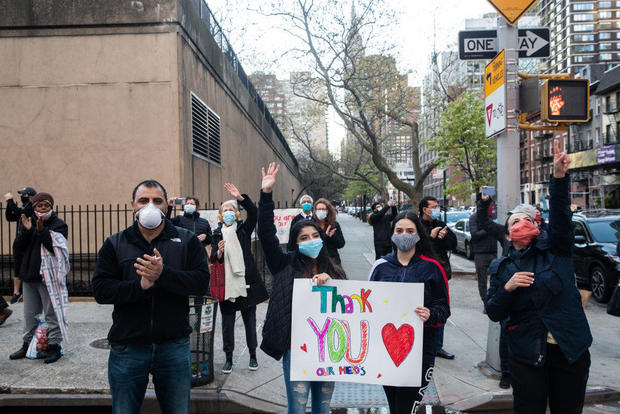
Getty
Human Rights Watch concerned about COVID-19 aid for Syria
Human Rights Watch says medical supplies to prevent and treat the new coronavirus are not reaching northeast Syria because of restrictions imposed by the Syrian government and the Kurdish regional government.
The organization urged the U.N. Security Council to immediately adopt a resolution reopening the Al Yarubiyah border crossing from Iraq into the northeast, where Syrian Kurds established an autonomous zone in 2012. The crossing, which was used primarily to deliver medicine and medical supplies, was closed in January at the insistence of Russia.
Louis Charbonneau, U.N. director for Human Rights Watch, stressed at a video press briefing that “this is not a political question, it’s a humanitarian question, (and) very easy for the Security Council to move quickly.”
Cuomo discusses “un-PAUSE” plan for New York
New York Governor Andrew Cuomo discussed a framework Tuesday for the state to eventually “un-pause” from its stay-at-home order. Cuomo said the 12-step “data-driven” plan will start on a regional basis on May 15, but cautioned that restrictions in New York City will likely be extended.
Reopening regions will be contingent on a number of data monitoring mechanisms that the governor referred to as “circuit breakers.” If hospitals in a region go above 70% capacity, or its coronavirus infection rate goes over 1.1%, then the region’s pause will not be lifted.
A 1.1% infection rate of COVID-19 is “outbreak status,” Cuomo said, noting that New York currently has an infection rate of 0.8%. The governor said “tight margin of error” must be monitored closely.
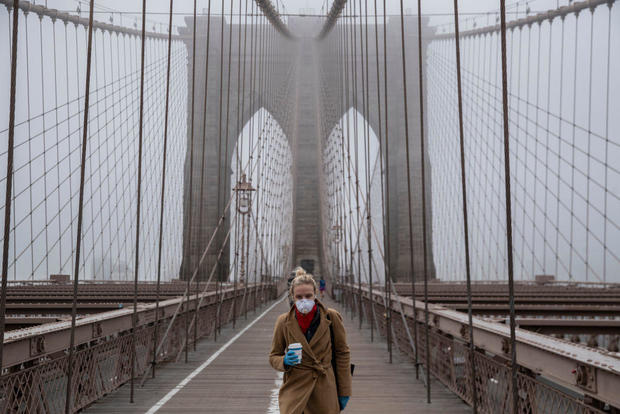
Getty
Alabama governor allows beaches and retail stores to open with limits
Alabama Governor Kay Ivey said Tuesday that retail stores, beaches and non-emergency medical procedures can resume, with limits, later this week. Ivey said a “safer at home” order will take effect 5 p.m. Thursday evening when the current stay-home order expires.
The restrictions will continue through May 15. Ivey said the state can “roll back” some of the restrictions that had been in place.
“Like everyone else I look forward to easing back to our routines with caution,” Ivey said at a news conference.
The changes do not go as far as Georgia’s aggressive timetable for reopening. Alabama restaurants will remain closed for on-site dining. Hair salons, nail salons, tattoo parlors and other close-contact services will remain closed.
She said the state has seen a leveling off, but not a decrease in virus cases. According to state health officials, there have been more than 6,500 confirmed cases of COVID-19 in Alabama, and at least 241 virus-related deaths.
Ivey said the state is taking a step to resume normal routines, but continued social distancing is needed to contain the spread of the virus.
“Let me be abundantly clear. The threat of COVID-19 is not over. We are still seeing the virus spread,” Ivey said.
All retail stores can open but will be limited to 50% occupancy. Beaches can open with limits to gatherings of ten people and 6 feet of separation between people.
New Jersey governor reports 2,887 new cases and 402 new deaths
New Jersey Governor Phil Murphy said Tuesday that 113,856 COVID-19 cases have now been confirmed in the state, including 2,887 new cases.
He also reported 402 new deaths due to the virus.
While we’re seeing progress in some key metrics, there is one number which always gives us pause.
Sadly, we must report 402 additional deaths. We’ve now lost a total of 6,442 members of our New Jersey family to #COVID19 related complications. pic.twitter.com/F7Zvx6NNoD
— Governor Phil Murphy (@GovMurphy) April 28, 2020
Flyovers by Thunderbirds and Blue Angels honor medical workers
The U.S. Air Force’s Thunderbirds and Navy’s Blue Angels are conducting flyovers in New York City and other cities in the Northeast on Tuesday. The joint flyover is a salute to frontline workers fighting the coronavirus pandemic.
Their flight path on Tuesday began at 12 p.m. ET over New York City, the Newark, New Jersey area, northern suburbs and parts of Long Island.
The Thunderbirds and Blue Angels will head south over New Jersey to Trenton, where they’re expected at 1:45 p.m. They finish off in Philadelphia at 2 p.m.
Atlanta, Houston, Austin, Dallas and Baltimore are among the dozens of cities where flyovers are expected to also happen. Residents in these areas are advised to watch the flyovers from the safety of their home-quarantine and should maintain all social distancing guidelines during the event.
House scraps plans to return to the Capitol while Senate forges ahead
The House of Representatives has canceled plans to convene next week as originally planned, House Majority Leader Steny Hoyer announced Tuesday, citing the continued rise of coronavirus cases in the D.C. metro area. The Senate is still expected to return to the Capitol next week.
Hoyer told reporters that he came to the decision after consulting with the Capitol’s attending physician. He also said the next legislative package to respond to the economic fallout of the coronavirus pandemic was unlikely to be ready for a vote by next week.
“We made a judgment that we will not come back next week but that we hope to come back very soon,” Hoyer said. “The House physician’s view was the risk to members was not one he would recommend taking.”
The House and Senate have the same attending physician.
Hoyer said in an email to House members that “they will be given sufficient notice of when they would need to return to Washington, DC.”
COVID-19 is changing how Americans spend
America’s culture of consumerism took an unexpected detour along with the coronavirus pandemic. As stay-at-home orders spread across the United States, shoppers opened their wallets to buy products ranging from the comforting to the indulgent.
In the broadest sense, shopping data show, two concerns seem to be driving much of what consumers are buying during the health crisis: Fear of vital supplies running out and, relatedly, the challenge of being cooped up at home for months on end. In practical terms, that means more toilet paper, more food and — with bars shuttered — more liquor.
The initial flurry of spending spiked in mid-March and remains elevated, leading to continuing shortages on store shelves. But Americans are also turning to projects like home improvement and gardening, undertakings that offer a sense of control in a wildly uncertain time.
“It’s a changed world,” said Anne-Marie Roerink, principal and founder of marketing research company 210 Analytics. “I call it ‘in-sourcing.’ People are fascinated by doing things themselves.”
Millions of Americans can’t afford food, rent and other basics, report finds
The coronavirus’ seismic hit on the U.S. economy is rattling people’s finances. Roughly 41% of working-age adults say their families have experienced a job loss, a decrease in work hours or other employment-related declines in income in recent weeks, according to a new analysis by the Urban Institute.
Underscoring the jump in financial distress around the country: More than 4 in 10 of Americans whose work was affected by the pandemic said they weren’t able to pay the rent, mortgage or utility bills; skipped medical care; or were at risk of going hungry.
The findings are based on an internet survey of more than 9,000 adults between March 25 and April 10. The time frame suggests Americans’ financial problems are even more widespread now, given the millions of workers have lost their jobs since that time.
Ohio primary a test of mail-in voting during the pandemic
Results from Ohio’s presidential primary are expected to be released Tuesday evening, a month after Governor Mike DeWine delayed the in-person primary in favor of an election determined mostly by mail-in ballots. Tuesday’s results are a test of how states can handle elections, including the upcoming general election, amid the coronavirus pandemic.
DeWine delayed the Ohio primary hours before polls were set to open on March 17, citing concerns about the spread of the virus. Voters were encouraged to instead vote by mail with a deadline of April 28. Ballots postmarked by April 27 but received after April 28 must be received by May 8 to count. Voters may also drive to their county board of elections and place their ballot in a secure drop box before 7:30 p.m. on April 28.
DeWine’s announcement prompted legal challenges and some confusion, as a judge initially denied the governor’s request to delay the primary. DeWine then said that polls would be closed due to a health emergency, with the order coming from the Ohio health director. The Ohio state legislature has since passed legislation that extended the vote-by-mail deadline to April 28.
There will still be some in-person voting on Tuesday, although it will only be available for individuals with disabilities or those who do not have permanent mailing addresses. Ohio Secretary of State Frank LaRose announced Monday that over 1.9 million Ohioans had requested a vote-by-mail ballot, and over 1.4 million had already cast their vote.
“In a matter of weeks, we’ve done something that’s taken other states years to do — transform our state into one capable of voting entirely by mail,” LaRose said in a statement.
Putin says Russia has not reached its virus peak
Russian President Vladimir Putin has extended anti-coronavirus restrictions until mid-May and warned that the country needs to brace for its “most intense period” in the pandemic.
In his fifth video statement addressing the new virus, Putin said Tuesday that various lockdown measures introduced across the country helped slow the spread of the disease, but he added that a more difficult time is ahead. “We haven’t passed the peak yet,” Putin said.
He prolonged the country’s “non-working” regime for non-essential businesses until May 11, which will include Russia’s two public holidays. But he also ordered the government to draft recommendations on gradual easing of the lockdown restrictions starting May 12.
The country reported 6,411 new coronavirus cases, another one-day record, on Tuesday, bringing the country’s official number of cases up to 93,558. Russia now ranks eighth as the country with the most confirmed coronavirus cases, according to a tally from Johns Hopkins University.
NYC mayor outlines new grading policy for public school students
New York City schools will implement a new grading system for the remainder of the coronavirus-disrupted school year, Mayor Bill de Blasio announced Tuesday. Elementary school students will be graded “meeting the standards” or “needing improvement” while high school students will have a pass-fail grading option, de Blasio said.
Acknowledging that some students have made a relatively smooth transition to online learning since schools were shuttered last month while others have struggled, de Blasio said students who need help to catch up will be given academic support through the summer and into next fall.
“We have to recognize that some kids are having a tougher time because of this crisis, emotionally and academically,” de Blasio said. He added, “Here’s the bottom line: Every student is going to be able to get the help they need.”
New York City school buildings have been closed since March 16.
Pentagon agency DARPA working on cloning antibodies to fight COVID-19
A Pentagon agency is working to produce an antibody treatment to combat the novel coronavirus until a vaccine is ready.
The Defense Advanced Research Projects Agency (DARPA), a research and funding branch of the Defense Department known for its out-of-the-box innovations, aims to “make pivotal investments in breakthrough technologies for national security.” Its inventions include the internet, Siri, GPS, videoconferencing and even self-driving cars.
Now, DARPA is racing against time as experts warn of a likely second wave of the coronavirus this fall.
Dr. Amy Jenkins leads DARPA’s Pandemic Prevention Platform (P3). The program, which launched in 2018, works with outside researchers to develop a quick response to emerging infectious diseases with a goal of delivering medical countermeasures in 60 days. P3 is currently working with two universities, Duke and Vanderbilt, and two pharmaceutical companies, AbCellera and AstraZeneca, on a COVID-19 response.
Their primary focus is to create an antibody therapeutic, which Dr. Jenkins called a kind of “temporary vaccine” to prevent infection if individuals are exposed to COVID-19. Unlike a regular vaccine, which creates permanent immunity, this therapy would create immunity for several months. The intention is to utilize this treatment as a bridge until a vaccine is developed.
The antibody therapeutic would be immediately effective because the body starts producing antibodies within hours, as opposed to a traditional vaccine, which can take weeks.
Read more here and watch the full story below:
Moderna ready to move potential coronavirus vaccine to phase 2
Massachusetts biotech company Moderna says it’s ready to move into the second phase of its development of a potential coronavirus vaccine, CBS Boston reports.
Moderna has been testing healthy adult volunteers with three doses of the vaccine.Those results are not available yet, but the company has now asked the Food and Drug Administration to move onto phase two which involves two vaccinations and studying those volunteers for a year.Depending on the previous results, phase three could begin in the fall.
Tokyo Olympics official says COVID-19 may force the games to be “scrapped” completely
If the coronavirus pandemic hasn’t been brought firmly under control by next year, then the Tokyo Olympics will have to be scrapped, according to Tokyo 2020 President Yoshiro Mori. In some of the strongest language he’s used since the Games were postponed from this summer, Mori said Tuesday that he just doesn’t see a scenario where the Olympics can be held as scheduled next year.
Asked if the Games might be delayed again if circumstances didn’t permit them to go ahead in 2021, Mori was clear: “In that case, the Olympics will be scrapped.”
In some pushback, the organizers of the Games have now said that was just Mori’s opinion, and nothing is certain, noting that we’re still more than a year away from the new date set for the Tokyo Games on July 23, 2021.
The only other times the Olympics have been cancelled is during times of war: during both World War I and II, in 1916, 1940 and 1944.
Even if the Games are held next summer, they might look very different to what we’re used to, with few, or even no fans in attendance.
The news that the Games could possibly be cancelled came on the same day that China’s top medical research institute predicted the coronavirus that causes COVID-19 would “co-exist with humans for a long time,” be “seasonal,” and be “sustained within the human body.”
Nantucket is asking seasonal residents to quarantine upon arrival
As summer approaches, Nantucket is bracing for its annual influx of seasonal residents to descend on the island. This year, the town is asking them to take extra precautions to avoid spreading the coronavirus, CBS Boston reports.
Summer residents are being told to self-quarantine for two weeks as soon as they arrive. They’re encouraged to bring enough supplies, including food and medicine, to last for that period.
“As an island community we have been successful in limiting the extent of the impact of the coronavirus on Nantucket by implementing early and vigilant physical distancing measures, as well as the collective actions of our citizens, and the relative isolation of our island,” the town said in a letter. “However, we are concerned that could change when our population increases going into the summer.”
So far, Nantucket has 10 confirmed cases of the coronavirus.
Hy-Line Cruises, the company that operates ferries to Nantucket and Martha’s Vineyard, will require passengers to wear face masks starting Wednesday.
JetBlue to require passenger masks. Should all airlines do the same?
A union for flight attendants is calling on the federal government to require everyone who flies — including airline crew members and passengers — to wear face masks in order to protect vulnerable airline employees and stop the spread of the coronavirus.
Major airlines including legacy carrier United and wallet-friendly carrier Frontier, both members of the Association of Flight Attendants (AFA), already require flight attendants to wear protective face masks or coverings when on-duty. American and Delta recently announced similar mandates.
But none extend to airlines’ customers. Only JetBlue, as of Monday, requires both crew members and customers to wear face coverings during travel. It is the first airline in the U.S. to announce such a policy, which will go into effect May 4 — and could help usher in a new era of flying etiquette.
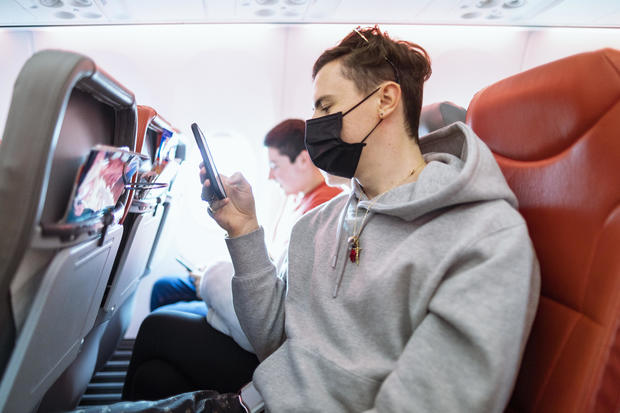
Getty
Sean Penn’s nonprofit to expand free virus testing sites
The nonprofit founded by actor and activist Sean Penn is helping manage free drive-thru coronavirus testing sites in California. CORE, which Penn created after the 2010 earthquake in Haiti, told “CBS This Morning” it will open new testing sites in New Orleans, Atlanta and Detroit.
“This is right now an active shooter scenario, the virus is. And its principal focus is on people of color, the elderly, the indigenous,” Penn told CBS News correspondent Jamie Yuccas. “But it doesn’t really care who else is in the way.”
At 10 sites around California including Los Angeles, Penn and his CORE team are distributing free test kits to free up the city’s first responders for emergency services.
Watch the full report:
Gospel singer Troy Sneed dies from coronavirus complications at 52
Grammy-nominated gospel singer Troy Sneed has died from complications with the coronavirus. He was 52.
Sneed’s publicist Bill Carpenter said the singer died early Monday at a hospital in Jacksonville, Florida. Sneed earned a Grammy nomination for his work on the Youth For Christ’s 1999 album “Higher.”
Sneed traveled throughout the United States early in his career to sing the gospel with the Georgia Mass Choir. He arranged music on their albums and appeared with the choir in 1996 film “The Preacher’s Wife,” starring Whitney Houston and Denzel Washington.
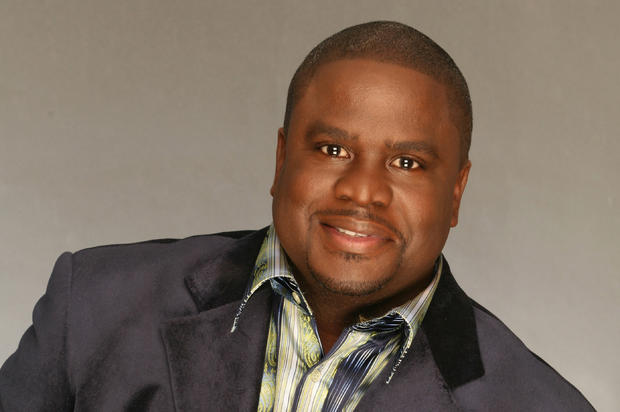
Tim Dahn / AP
Trump claims U.S. COVID-19 testing “more, and better” than any other country
President Trump claimed in a tweet Tuesday that the U.S. was doing “far more, and better” testing for the new coronavirus “than any other country in the world.”
His assertion comes after criticism that the White House was slow to boost testing efforts, allowing the disease to spread quietly for weeks. The tweet came a day after the Trump administration announced new coronavirus testing guidelines that offer some help, but largely put the onus on states to coordinate and conduct testing.
Broad testing to identify patients, and contract tracing to find people who may have been exposed, are both considered vital to getting a grip on the deadly disease.
“We are doing far more, and better, Testing than any other country in the world, and yet the media does nothing but complain,” alleged the president. “They will never say we are doing a great job, they will only viciously gripe!”
We are doing far more, and better, Testing than any other country in the world, and yet the media does nothing but complain. No matter how good a job is done, the same as with the Ventilators, they will never say we are doing a great job, they will only viciously gripe!
— Donald J. Trump (@realDonaldTrump) April 28, 2020
Data compiled by the worldmeters.info website show that, while the U.S. has tested more people than any other nation, it’s far from being the leader in testing efforts in relative terms. Germany, by way of example, has been widely lauded for quickly controlling the spread of the coronavirus through early, widespread testing.
The website’s data show that about 17,200 per 1 million U.S. inhabitants have been tested, while in Germany the figure is 24,738 per million. Hard-hit Spain and Italy have tested approximately 29,000 people per 1 million inhabitants.
Winston the pug is apparently the first dog in the U.S. to test positive for COVID-19
The pet dog of a family taking part in a study at Duke University is apparently the first in the U.S. to test positive for the virus that causes COVID-19.
Dr. Chris Woods, the lead investigator of the Molecular and Epidemiological Study of Suspected Infection (MESSI), confirmed in a statement to CBS News that, “To our knowledge, this is the first instance in which the virus has been detected in a dog. Little additional information is known at this time as we work to learn more about the exposure.”
Early last month, Hong Kong health authorities said a coronavirus patient’s pet dog that tested positive for the virus was “likely” the first case of human-to-animal transmission.
WRAL-TV in Raleigh, North Carolina, which was first to report the U.S. development, said the dog, a pug named Winston, is part of a family in Chapel Hill.
How the coronavirus crisis is reshaping a special contest for a Maryland seat in Congress
In an unprecedented Maryland election, three polling centers will be open Tuesday in a special election between Democrat Kweisi Mfume and Republican Kimberly Klacik in a congressional race dramatically reshaped by the coronavirus pandemic.
Officials have been urging the electorate to vote by mail for weeks, after roughly 484,000 ballots were mailed earlier this month to registered voters in the state’s 7th Congressional District to choose a candidate to finish the term of the late Rep. Elijah Cummings. He died in October.
After thousands of Wisconsin voters waited hours in line outside crowded polling stations for that state’s recent primary, Maryland sent ballots to eligible voters weeks in advance to encourage as many mail-in votes as possible — in a test of how future elections might safely be held during the pandemic.
Pro-Biden political ad blames Trump for putting “America First” in COVID-19 infections
A new ad campaign from a pro-Joe Biden super PAC says President Trump’s mantra of “America First” has come to fruition in one arena — COVID-19 illnesses and deaths in the U.S.
The ad, dubbed “First,” is set to run in Michigan, Pennsylvania and Wisconsin, three battleground states that were key to Mr. Trump’s 2016 electoral win over Hillary Clinton. Priorities USA, an unaffiliated super PAC that supports Biden, said it is spending more than $2 million on the television and online ads for the next two weeks.
“Donald Trump said he would put America first and now he has,” the ominous ad booms as images of stretchers flash across the screen, “The United States leads the world in Coronavirus cases.”
Jordanians turn to an ancient hobby to ease coronavirus lockdown tedium
In the afternoon, 15-year-old Ramy looks forward to flying his blue kite to break up the monotony of life under coronavirus lockdown. He joins hundreds of other Jordanians of all ages who’ve taken up the ancient hobby to help ease the tedium of the measures imposed on the kingdom more than six weeks ago to prevent the spread of the virus.
Most Jordanians are banned from using their vehicles or public transport, so many escape to rooftops and street corners to fly homemade kites. Charities and businesses saw a marketing opportunity and started distributing branded kites, with the slogan “stay home” printed on them, to children across the country.

Jordan Kuwait Bank/Hamzeh Mazraawi
“We wanted to encourage kids to stay home and help some daily laborers to get some needed work,” Dana Jaradat, head of marketing at a local bank, told CBS News. The bank has handed out free kites in east Amman, a densely populated, working-class area of the capital.
Jordan’s roughly 10 million people were ordered to stay home in mid-March, and the lockdown seems to have been effective: Fewer than 450 COVID-19 cases have been confirmed in the country, and there have only been seven related deaths.
Last week the government began easing lockdown measures, allowing some sectors of the economy to restart. From Wednesday, Jordanians will be allowed to use their vehicles again – but only within their own governates (equivalent of states), from 8 a.m. until 6 p.m. every other day (odd number license plates one day, even the next).
The government has promised further easing of the rules soon.
— Amjad Tadros
Price of U.S. oil sinks toward $10 a barrel as fund sells off holdings, storage concerns mount
U.S. oil nosedived towards $10 a barrel Tuesday after a major exchange-traded fund started selling its short-term contracts of the commodity, and storage concerns mounted as the coronavirus strangled demand. In morning London deals, West Texas Intermediate crude for June delivery tumbled more than 21% to $10.07, having plunged 25% a day earlier.
International benchmark Brent crude slid 4.9% to trade at $19.01 a barrel.
The latest market drop was driven by the United States Oil Fund — a massive, oil-backed exchange-traded fund (ETF) — saying it would sell all its holdings in the contract for June delivery. By investing in longer-dated contacts, the fund’s move put pressure on the June contract, analysts said.
The move highlighted continued concerns that storage is filling up and that when futures contracts do expire, buyers may find there is little space to put the oil they have purchased.
Scientific model often cited by White House raises predicted U.S. COVID-19 death toll to 74,000
The scientists at the University of Washington whose data models are most often cited by the White House and state health officials have raised their prediction of how many people the coronavirus will likely kill in the U.S. by more than 14,000 in the space of just two weeks.
The university’s Institute for Health Metrics and Evaluation (IHME) said late Monday that COVID-19 could cause more than 74,000 deaths by the first week of August. IHME director Christopher Murray warned that the predicted death toll would go higher if states reopened their economies too early.
Last week, the Institute’s model put the expected death toll at 67,000. That was before about 20 states announced plans to start easing the measures proven successful at curbing the spread of the virus.
As of Tuesday morning, Johns Hopkins University said the disease had killed 56,253 people in the U.S.
Japan’s nurses and doctors facing barrage of COVID-19 abuse and stigmatization
Nurses and doctors battling Japan’s mounting coronavirus epidemic are also facing abuse, hysteria and harassment from their fellow citizens.
“Why are you nurses walking around outside? It’s absurd.” a nurse found herself accosted by an agitated man as she returned to her car. “It’s your fault the virus is spreading!”
“You work at the hospital, right?” a group of mothers interrogated another nurse in a Tokyo park. “We’d appreciate it if you stayed away.” Shocked, the nurse immediately took her kids home, she told the TBS network. “It’s as if they equate nurses with coronavirus.”
Multiple cases of healthcare workers’ children being kicked out of public daycare centers — forcing some nurses to stay home or even leave the profession — have compelled the government to issue a statement that “prejudice and discrimination toward the children of medical workers is absolutely not permissible.”
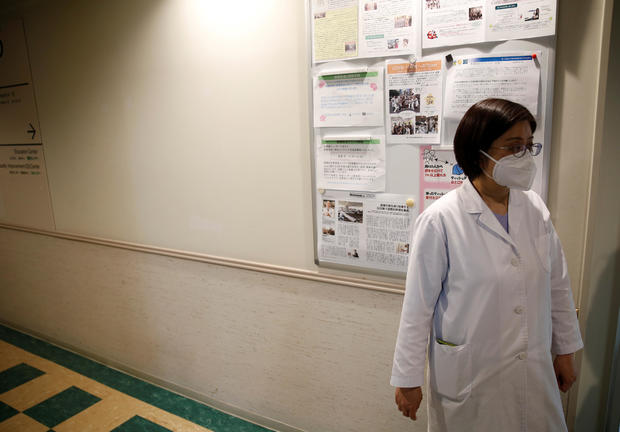
Reuters
Prolonged coronavirus lockdowns could mean 31 million more domestic violence cases, UN warns
Six months of lockdowns to prevent the spread of COVID-19 could lead to 31 million additional cases of domestic violence globally, the United Nations warned Tuesday.
“It is a growing crisis within the crisis. We need to pay maximum attention to this now,” Dr. Ramiz Alakbarov, deputy director of the United Nations Population Fund (UNFPA), the UN’s sexual and reproductive health agency, told CBS News.
In a paper using data from Johns Hopkins University, Avenir Health, and Victoria University in Australia, the UNFPA predicted that if strict lockdowns continue for a year, there will be an additional 61 million cases of domestic abuse above what would have already been expected to occur.
“It’s truly disturbing. And if we don’t do anything about it — if we don’t talk about it, if we don’t ring the alarm bell — every three months there will be an additional 15 million cases,” Alakbarov said.
CDC compiles new guidelines to help organizations reopen
Health officials are compiling guidelines to help businesses, churches and other organizations safely reopen when the time comes.
Among the recommendations: Businesses should close break rooms, restaurants should consider disposable menus and plates, and schools should have students eat lunch in their classrooms.
The draft guidance from the Centers for Disease Control and Prevention has been sent to Washington but still could be revised before the Trump administration unveils it to the public.
The CDC put together so-called decision trees for at least seven types of organizations: schools, camps, childcare centers, religious facilities, mass transit systems, workplaces, and bars/restaurants.
U.S. auto plants likely to stay idle another 2 weeks
Fiat Chrysler is backing off a planned May 4 restart at its North American factories because some U.S. states will still have stay-home orders in place.
The move likely means factories of all three Detroit automakers will be idled for at least another two weeks as they negotiate reopening terms with the United Auto Workers union.
“In light of the updated state stay in place orders, the company is re-evaluating its plans to resume its North American operations and will communicate new restart dates in due course,” FCA said Monday night in a statement.
Ford, General Motors and FCA factories have been idled for over a month due to fears of spreading the coronavirus.
In Michigan, where FCA has multiple factories, Gov. Gretchen Whitmer is taking a “hard look” at whether to let industrial sectors like manufacturing reopen in the next phase of loosening restrictions.
The Democratic governor also said she will ask the Republican-led Legislature to lengthen her emergency declaration by 28 days before it expires late Thursday.
Brian Rothenberg, a UAW spokesman, said the union hasn’t heard of any restart dates from the automakers. GM said it hasn’t announced a start date, while Ford said a date hasn’t been determined.
Southern California city offering free COVID-19 testing for all residents
Carson city officials Monday opened the first COVID-19 testing site in Southern California that is free to all residents, including those who are asymptomatic.
“Whether you’re rich or poor, you can be tested. Whether you’re insured or uninsured, you can be tested. Whether you’re a resident of Carson or a non-resident of Carson, you can be tested. But, the priority is Carson residents,” said Carson Mayor Albert Robles.
Robles said the free drive-through screening at the Congresswoman Juanita Millender-McDonald Community Center is not just for people who show symptoms.
People who may have been exposed to the virus can also get tested. The mayor said the city council has been asking LA County for a testing site because of the high infection rate among its population.
“Latinos and African Americans are dying at a much higher rate. These two population groups are disproportionately impacted,” said Robles.
Read more here.
White House testing and tracing guidance puts much of the burden on states
CBS News has obtained the White House’s new guidance given to states on how to test and trace for the coronavirus, a path forward that relies heavily on states with some assistance from the federal government.
A significant amount of the text in the documents, crafted by the White House, highlight things the administration has already done in the testing sphere. And while the White House says it will support states with some resources such as tracing assistance from the Centers for Disease Control, many of the sentences in the guideline begin with the words “states should.”
At the same time, Admiral Brett Giroir, the assistant secretary for health, confirmed to CBS News that the Trump administration is prepared to send all 50 states enough tests to screen 2% of their population per month for the virus.
 The Argus Report Read about it!
The Argus Report Read about it!
